
Pro Chancellor, OUM
Having served as the Pro Chancellor of OUM since July 2005, the 25th anniversary personally represents two decades of shared journey, witnessing OUM’s progress and success.
I feel privileged to have presented graduation certificates to over 100,000 graduates. OUM graduates are special to me as most of them are working adults, with families and committed to lifelong learning. They have shown diligence and resilience in overcoming the challenges of balancing work, studies, and family life, which often demands sacrifices. I always look forward to attending all the convocation sessions, where the highlight for me is delivering my speech to the graduates, during which I share my thoughts and advice on cultivating good values and soft skills.
Looking ahead, I envisage an ever-growing number of learners pursuing studies in new sectors such as next-generation artificial intelligence, robotics, autonomous mobility, multiomics, and blockchain technologies.
Congratulations to OUM for a fine track record and 25 years of growth, innovation, and success. Let us continue this excellent performance for the next 25 years!
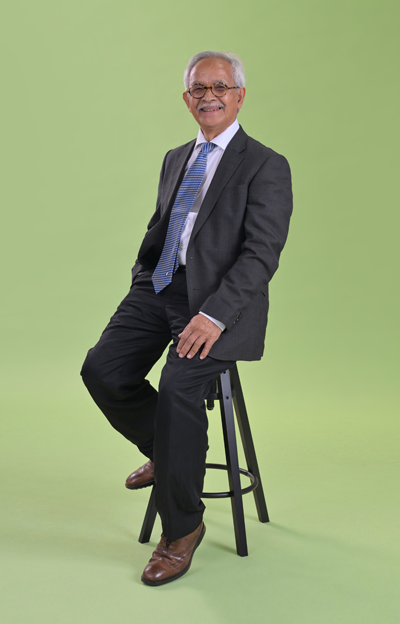
Chairman of OUM’s
Board of Governors
Reflecting on OUM’s 25 years, I am filled with immense pride, joy, gratitude and hope.
This institution has not only provided educational opportunities to tens of thousands, but has also fostered a vibrant community of learners and educators, thus enriching the nation.
I am aware of the transformative power of OUM’s flexible learning model, empowering individuals to pursue their academic aspirations regardless of their circumstances.
This anniversary is a celebration of perseverance, innovation, and the enduring belief in the power of education to change lives.
To all who have been a part of this incredible journey— thank you for your invaluable contributions. May the next 25 years be even more rewarding and impactful.

Chairman of METEOR Board of Directors, Vice-Chancellor of Universiti Malaya
OUM’s legacy is not what it leaves behind but what it seeds in others. And the future? It is where those seeds take root, unfolding in ways both imagined and yet to be seen, with OUM contributing to a new dawn of success.

Group Chief Executive Officer, METEOR
When METEOR was first established, the goal was clear: to provide comprehensive and enhanced solutions via technology to all industries, including education. OUM was born from that vision, and today, it stands as our flagship institution and a testament to what can be achieved through bold thinking and collective will. Congratulations to OUM on 25 years of transformative impact and continued excellence
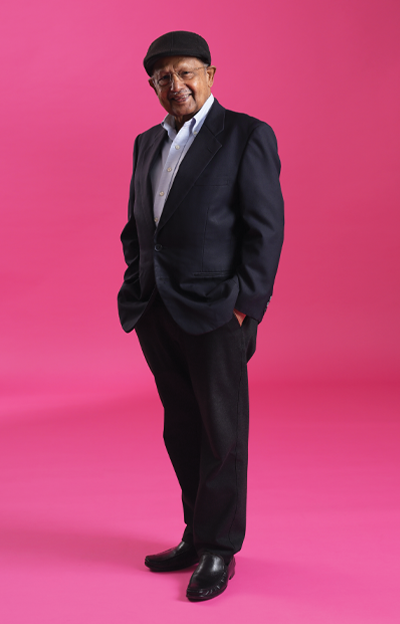
Strategic consultant, member of OUM’s Board of Governors
Being part of OUM’s journey in empowering learners and fostering innovation has been both inspiring and humbling. I am deeply committed to supporting the university’s vision of transforming lives through accessible, high-quality education. I am truly grateful for this opportunity to contribute to its remarkable mission.

Stewards of today and architects of tomorrow, the five members of OUM’s Executive Management Committee (EMC) are entrusted with safeguarding the University’s present while boldly steering it toward a future of radical possibilities.
[Left to right:] Prof Dr Yon Rosli Daud, Prof Dr Ahmad Izanee Awang, Assoc Prof Dr Tuan Fatma Tuan Sulaiman, Prof Datin Dr Santhi Raghavan, and Prof Datuk Dr Mohd Tajudin Md Ninggal
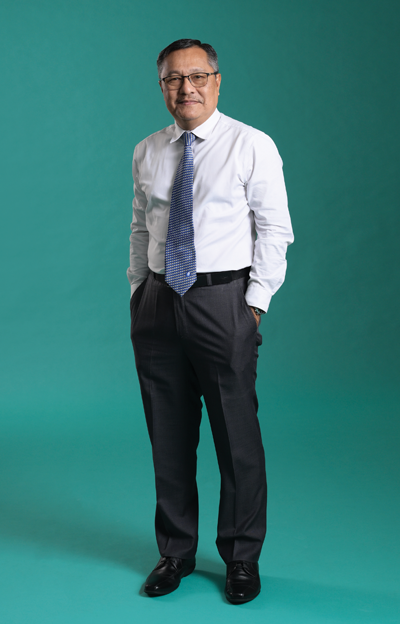
President/Vice-Chancellor
Leading OUM into the future is not just about leveraging technology. While it is critical to adopt the best digital tools that fit our purposes to improve access and flexibility, the deeper task is to ensure each advance strengthens OUM as a place of critical inquiry, social connection, and meaningful engagement with global challenges. The use of technology in education must be judicious, aligned with pedagogical needs, ensuring accessibility for all learners.
Our Strategic Roadmap 2022–2026 lays important groundwork by reaffirming our mission to widen educational access and by prioritising digital delivery, flexible pathways, and global partnerships. Yet these moves are only the starting point within a broader, long-term vision. We are navigating an era shaped not only by environmental and geopolitical shifts but also by algorithmic futuring — the rise of predictive technologies shaping educational spaces. Addressing these challenges requires deep institutional imagination and the readiness to rethink prevailing sociotechnical assumptions.
The creation of the Centre for Digital Education Futures (CENDEF) signals OUM’s commitment to redefining progress beyond conventional metrics, through co-designed, context-sensitive approaches that embrace the messy, non-linear nature of real-world change. Through CENDEF, we are building a participatory and reflective culture of innovation, ensuring education remains a transformative force even amid uncertainty.

Vice President/Deputy Vice-Chancellor (Academic and Research)
Contrary to conventional wisdom, the future is not a fixed destination waiting to unfold. It is not singular, but plural—a constantly evolving horizon of possibilities, probabilities, and preferences. The future is not merely ahead of us; it is among us, shaped in real time by competing narratives, cultural tensions, and the decisions we make today. It is less an object of prediction and more a contested arena—fluid, uncertain, and profoundly entangled with who we are, what we value, and how we act.
To grasp the future in this light is to reimagine education—not as a conveyor belt into an unknown tomorrow, but as a generative force in the making of that tomorrow. It demands an academic and research culture that is not only participatory and reflective, but also interventionist. One that embraces complexity not as a barrier, but as fertile ground for innovation and renewal. A culture that is unafraid to challenge orthodoxy, provoke critical inquiry, and cultivate the courage to imagine otherwise.
In this spirit, I believe that OUM’s future lies not in ‘future-proofing’ itself through generic adaptability, but in fully embracing its role as a catalyst of meaningful transformation. Our strength will lie in fostering the capacities to anticipate change, to intervene with purpose, and to empower learners and communities to shape—not simply survive—the futures that are unfolding around them, and in doing so, to contribute meaningfully towards nation building.
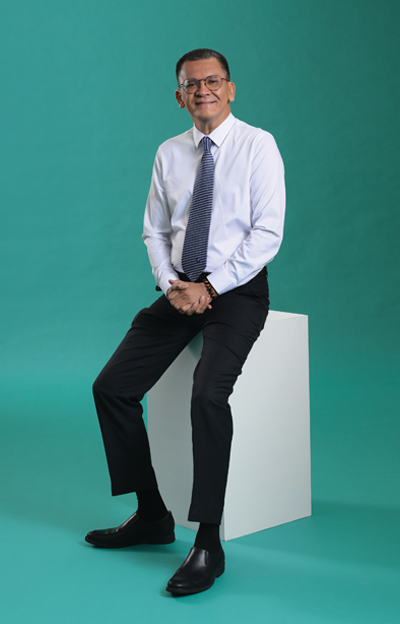
Vice President/Deputy Vice-Chancellor (Business Development)
OUM’s growth is driven by a simple principle: expansion must create real value, not just bigger numbers. My role in business development is to identify opportunities that strengthen OUM commercially, socially, and educationally. Whether through new partnerships, fresh markets, or ventures that meet practical needs, we focus on growth that makes a difference.
We are focused on creating collaborations that do more than tick boxes. This means engaging with industry players to develop training that actually helps people in the workforce, finding ways to serve underrepresented communities, and exploring regional links that open new doors. We keep an eye on global shifts, but we do not lose sight of local realities.
In the next 25 years, higher education will be shaped by challenges we are only beginning to understand, from climate pressures to shifting labour markets, and new forms of digital learning. OUM’s strength will depend on how well we anticipate these changes and act with purpose. My aim is to position OUM as a serious, reliable partner, one that others trust to deliver, and one that stays ahead by being alert and adaptable.
At the end of the day, business development is about building relationships that last and ventures that work. That is what will keep OUM relevant and thriving into the future.

Vice President/Deputy Vice-Chancellor (Learner Experience and Technology)
The future of learner experience will be shaped by complex and often contradictory forces. At OUM, while we continue improving digital systems to enhance access, flexibility, and support, we are also asking deeper questions about where these developments lead.
In the coming decades, we anticipate greater reliance on AI-driven personalisation, modular micro-credentials, and automated learner support. These trends offer new forms of access but risk making learning transactional, isolating, and overly metric-driven. Without care, education could fragment into products serving markets rather than people.
Our challenge is to resist this narrowing of purpose by building different futures. We envision learning environments that combine technological agility with social connection and a focus on the public good. This includes platforms that personalise pathways while fostering collective learning, ensuring no learner feels invisible. We are also exploring how to embed community-based learning into digital frameworks so education remains rooted in place and context, even online.
We recognise the need to embed sustainability and justice into our digital strategy. This means designing systems that minimise environmental impact, protect data sovereignty, and reflect the needs of the communities they serve. We want OUM to be a place where technology empowers learners and supports a fairer, more resilient society.
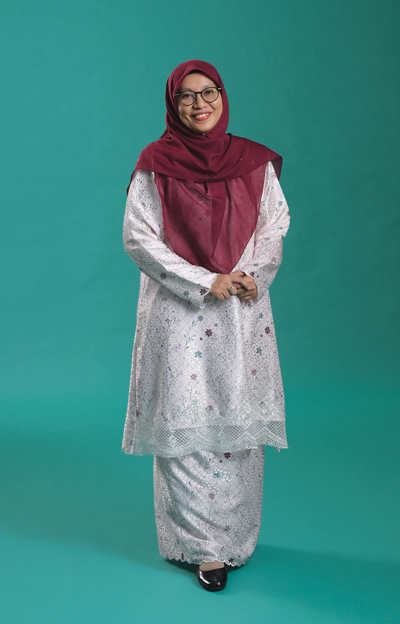
Registrar
My role at OUM is to uphold the institutional frameworks that ensure every learner’s journey is recorded with accuracy, transparency, and integrity. From academic regulations and Senate governance to records and certification, this work forms the backbone of the University’s credibility and trust.
Today, we are focused on strengthening the systems that keep the University resilient, accountable, and learner-focused. This includes advancing digital records, aligning with evolving data protection standards, and ensuring governance frameworks meet national and international standards. These efforts reinforce the trust that allows OUM to grow with purpose.
But our work must also look beyond efficiency and compliance. As higher education moves toward 2050, the Registrar’s role will be shaped not only by technological shifts but by societal and ethical questions. Expanded responsibilities may include managing digital identities, enabling decentralised learning, and navigating global data landscapes. Yet we must ensure these developments do not reduce learners to data points or education to a transactional process.
At OUM, we are laying the groundwork for this future by investing in ethical infrastructures and fostering a culture that values care, integrity, and responsibility. The goal is not just to prepare for a more digital university but to shape an institution that thrives, no matter what futures emerge.

Though they have completed their service, they are remembered for the foundations they built, the spirit they nurtured, and the legacy they left behind.
[Left to right:] Ramli Bahroom, Professor Emeritus Tan Sri Anuwar Ali, Dr Maheswari Kandasamy, and Repin Ibrahim
Though not in the group photo, Kamariah Mohd Noor is featured individually on a subsequent page.

Professor Emeritus Tan Sri Anuwar Ali was OUM’s President/Vice-Chancellor for 12 years from January 2004 to December 2015. He was instrumental in the development and expansion of OUM nationally and internationally.
One of the most critical elements in OUM’s organisational success has been its strong culture of teamwork. I believe this ethos was embedded from the University’s earliest days. The cultivation of shared values among staff was central to OUM’s emergence as a national leader in open and distance learning (ODL) and lifelong learning.
Alongside teamwork, four core values—integrity, professionalism, caring, and innovativeness—were consistently upheld. These were conveyed in word and deed by senior leadership, and reinforced during staff inductions, which included team-building activities led by experienced colleagues who led by example.
In my observation, these values inspired the entire OUM community to strive for excellence. This was evident in the rapid rise in learner enrolment, the expansion of academic programmes, and the growing network of learning centres nationwide.
Teamwork also enabled OUM to forge successful partnerships with institutions in the Maldives, Vietnam, Sri Lanka, Saudi Arabia, Ghana, India, and Hungary. Collaborations with other ASEAN open universities in areas such as ODL research and pedagogical innovation were a strategic focus as well.
These values remain deeply rooted at OUM today. I’m pleased to see the current leadership continuing to nurture them, a commitment reflected in the University’s 25th anniversary theme, which places the human element at the heart of all achievement.
Congratulations to OUM for honouring its legacy while continuing to lead with vision and heart.

Repin Ibrahim was unofficially involved in the formation of METEOR/ OUM circa 1997 while he was at Universiti Malaya. He joined METEOR/OUM as Director, Institute of Professional Development, on 1 August 2001, and officially retired in mid-2016 as Chief Operating Officer (COO) of METEOR and Vice President (Business Development) of OUM.
In late 1997 or early 1998, the Malaysian Vice- Chancellors’ Committee met at Universiti Malaya with a bold aim: to harness technology for the collective advancement of the country’s first 11 public universities.
Amid serious discussions, a light-hearted moment emerged when someone proposed naming the consortium KUAT—short for Konsortium Universiti Awam Tempatan (Consortium of Local Public Universities). While kuat means ‘strong’ in Malay, it also happens to be a well-known detergent brand, prompting laughter about the group being mistaken for a cleaning agent for academia.
To avoid the unintended association, the Committee chose a more fitting acronym: METEOR—Multimedia Technology Enhancement & Operations Sdn Bhd. The name evoked technical momentum and collaborative progress.
Established in 1999, METEOR aimed to enhance tertiary education and strengthen ties among member universities.
A year later, in 2000, METEOR gave rise to Open University Malaysia, which would go on to become a national leader in open and distance learning.
And so, what nearly launched as a detergent brand instead sparked one of Malaysia’s most impactful educational innovations—lighting the path forward, no scrubbing required.
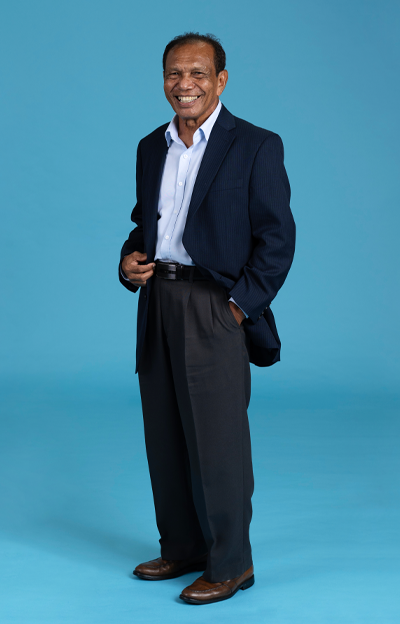
Ramli Bahroom joined METEOR as a Senior Project Manager and OUM as an Associate Professor in October 2002. He retired in October 2019 as Vice-President (Planning and Strategy) and Professor at OUM.
When the idea of establishing an open university was proposed by Multimedia Enhancement Operations Sdn Bhd (METEOR) in 1999, it was a bold initiative by the Vice-Chancellors’ Council (VCC) of Malaysia’s first 11 public universities. However, the concept was new to Malaysia, and METEOR lacked the necessary financial resources. Efforts to secure funding from banks were unsuccessful, as they were unfamiliar with the open university model. A senior government official then advised OUM to seek funding through a launching grant from the Federal Government.
Following this, OUM’s founding President, Tan Sri Dato’ Dr Abdullah Sanusi Ahmad, formed a small committee—comprising himself, Prof Dato’ Dr Mansor Fadzil, Puan Kamariah Mohd Noor, and me—to prepare a cabinet paper to request the grant. My key responsibility was to develop a 10-year financial plan to determine the required funding. After 37 iterations of financial projections, we finalised a request for RM150 million. The Cabinet approved our proposal in early 2001, granting RM100 million and providing a building at Universiti Malaya’s City Campus in Kuala Lumpur, valued at RM50 million.
OUM began operations in August 2001 and experienced only one semester of financial deficit. By January 2002, it was generating consistent annual profits and has continued to grow successfully ever since.

Dr Maheswari Kandasamy joined METEOR/OUM in 2001 and was appointed to the Institute of Professional Development (IPD). In 2007, she was promoted to Professor at the Faculty of Education and Languages, and Head of OUM International. She retired from OUM in June 2016, and has since served as an independent consultant in training and development.
Looking back on my time at OUM, I am proud to have played a key role in establishing and expanding OUM International.
Launched in 2008, OUM International served as a hub for international projects, customised training, and fellowships. I was closely involved in shaping its vision and operations, aligning our efforts to support Malaysia’s standing as a regional education hub.
From 2001 to 2016, I coordinated over 150 projects across countries, including the Maldives, Bangladesh, Sri Lanka, Japan, and Saudi Arabia, working with agencies like the World Bank, ADB, UNDP, and UNESCO. I also led consultancy and capacity-building initiatives with partners in Cambodia, Laos, and beyond, adapting strategies to suit diverse cultural contexts.
Over the years, my efforts at internationalising OUM have become institutionally enculturated. For this, I am immensely proud and grateful.
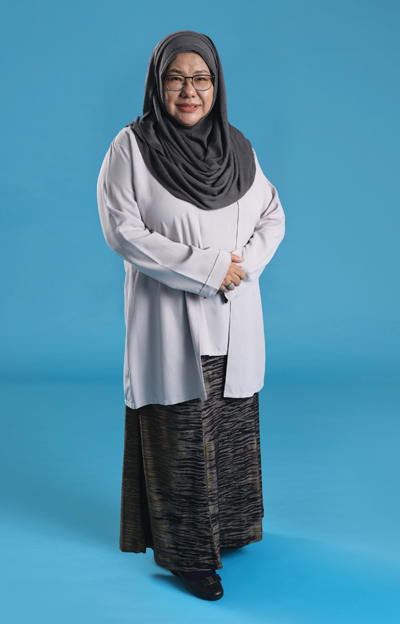
Kamariah Mohd Noor joined METEOR/OUM in June 2000 as General Manager and Registrar. She retired in 2021 as the Vice President of Marketing, Planning, and Learning Centre Management.
When we began work on OUM in 2000, we had a blank canvas to imagine what Malaysia’s first open university could become. Drawing on lessons from leading institutions around the world, we developed a model suited to our context. Once our blueprint was approved by the Ministry of Education, the journey officially began. Our first priority was bringing people together around a shared vision. It was a collective effort, driven by a belief in the transformative potential of open and distance learning.
We refined global models to fit local needs, and in time, OUM’s approach began to inform others exploring similar paths. From the start, we understood that technology would be central. Implementing the right tools to widen access became our focus. Looking back, I take pride in having been part of the early efforts that helped shape what has become a strong and reliable online learning system reaching learners across the country.
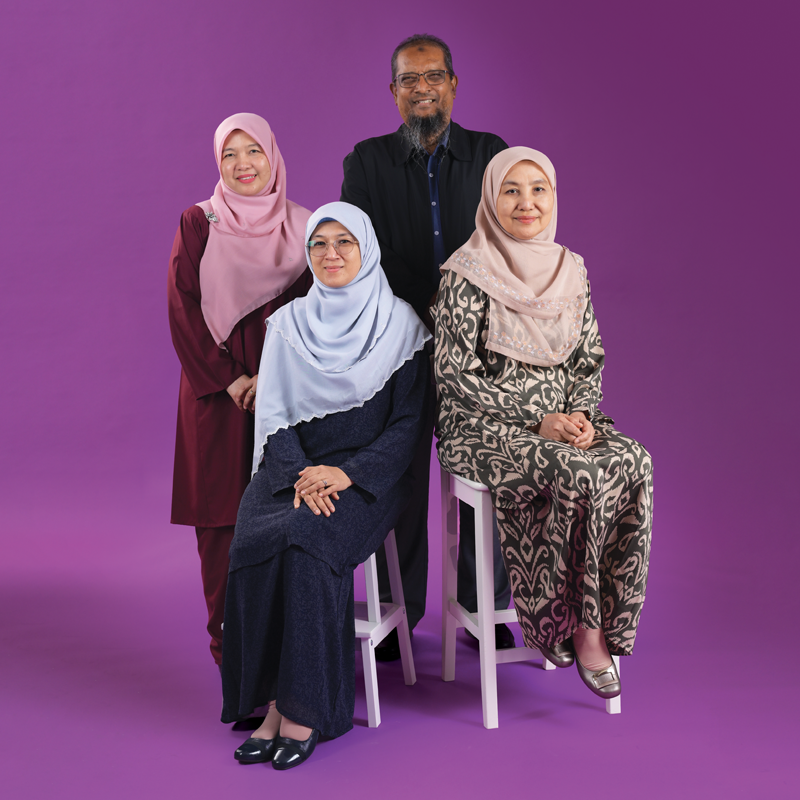
[Left to right:] Assoc Prof Dr Raziana Che Aziz, Assoc Prof Dr Hamidah Mat, Assoc Prof Dr Zahir Osman, and Assoc Prof Dr Aliza Ali
Assoc Prof Dr Raziana Che Aziz: Leadership in digital education demands clarity, care, and the courage to prioritise people over platforms. That means designing systems that support real needs, encourage connection, and never lose sight of the human behind the screen.
Assoc Prof Dr Hamidah Mat: We constantly revisit our approaches to ensure they align with the values we hold as educators. To lead is to ensure that care and connection are not lost in digital translation.
Assoc Prof Dr Zahir Osman: In every policy we craft and every curriculum we design, the learner remains at the centre. Humanising digital education begins by listening deeply to both data and lived realities.
Assoc Prof Dr Aliza Ali: We don’t just design content; we design for belonging. Humanising digital education means creating space where every learner feels seen, heard, and valued.

[Left to right:] Assoc Prof Dr Nantha Kumar Subramaniam, Assoc Prof Dr David Lim, Prof Datin Dr Santhi Raghavan, and Dr Azlina Abdul Aziz
Assoc Prof Dr Nantha Kumar Subramaniam: Back then, we had more passion than resources, but that didn’t stop us. We believed in the mission, and we worked with what we had to reach learners across the country. Seeing how far OUM has come today fills me with immense pride.
Assoc Prof Dr David Lim: In those early days, we weren’t just educators; we were builders, dreamers, and problem-solvers. Every challenge pushed us to innovate. What stayed constant was our belief that education should be accessible, human-centred, and future-ready.
Prof Datin Dr Santhi Raghavan: We were teaching in hybrid mode before most people even knew what open and distance learning meant. At the time, there was uncertainty, even scepticism, about whether this model could work in Malaysia. But we believed in it, and we made it work. It wasn’t just about using technology; it was about rethinking how we connect with learners, wherever they were.
Dr Azlina Abdul Aziz: I was among the first to explore online pedagogy when most people hadn’t even heard of e-learning. It’s amazing to see how far we’ve come, from physical CDs to fully digital ecosystems. We dared to try, and it paid off.

[Left to right:] Prof Dr Norjaya Mohd Yasin, Nurul Fizah Mohamad Nusran, Dr Loo Fung Lan, Joemmaicca Augustta Anak Joggery, Liana Mohamad
Prof Dr Norjaya Mohd Yasin: Navigating between digital and analogue teaching has sharpened my approach. Ultimately, it is not about choosing one mode over another, but about making each one work effectively for the learner.
Nurul Fizah Mohamad Nusran: To teach across modes is to meet learners where they are. Every platform becomes a bridge, not just for knowledge, but for connection and trust.
Dr Loo Fung Lan: Whether it’s pen on paper or pixels on screen, what matters is presence. OUM has shown me that meaningful teaching transcends tools and formats.
Joemmaicca Augustta Anak Joggery: My journey with OUM has taught me that flexibility is more than a skill; it is a mindset. Teaching in the digital age means adapting with care and staying human by placing empathy and presence at the centre of learning.
Liana Mohamad: Working across digital and analogue modes has refined how I teach, but not why I teach. Regardless of format, it is the quiet intent to connect that gives each lesson its meaning.

[Left to right:] Ramash Ananth K Ganeson, Chan Chin Jang, Azlinda Abd Rahim, Aznam Zakaria, and Azam Abdul Jalil
Ramash Ananth K Ganeson: Even behind the scenes, I’ve always tried to make every click feel like a connection. No learner should ever feel like just a number.
Chan Chin Jang: I do my part behind the scenes with pride and purpose, helping students overcome hurdles big and small. If their journey is a little smoother because of it, I’m grateful to have helped.
Azlinda Abd Rahim: Behind every system I help build is a learner reaching for something better. Knowing I play a small part in their journey keeps my heart in the work.
Aznam Zakaria: From behind the scenes in human resources, I help shape the workforce that brings digital education to life. I do my part in extending care to our staff so they, in turn, can care for our learners.
Azam Abdul Jalil: In every update and upload, I see a chance to bring warmth into digital spaces. My role may be unseen, but I take heart that its ripple can reach across a nation.
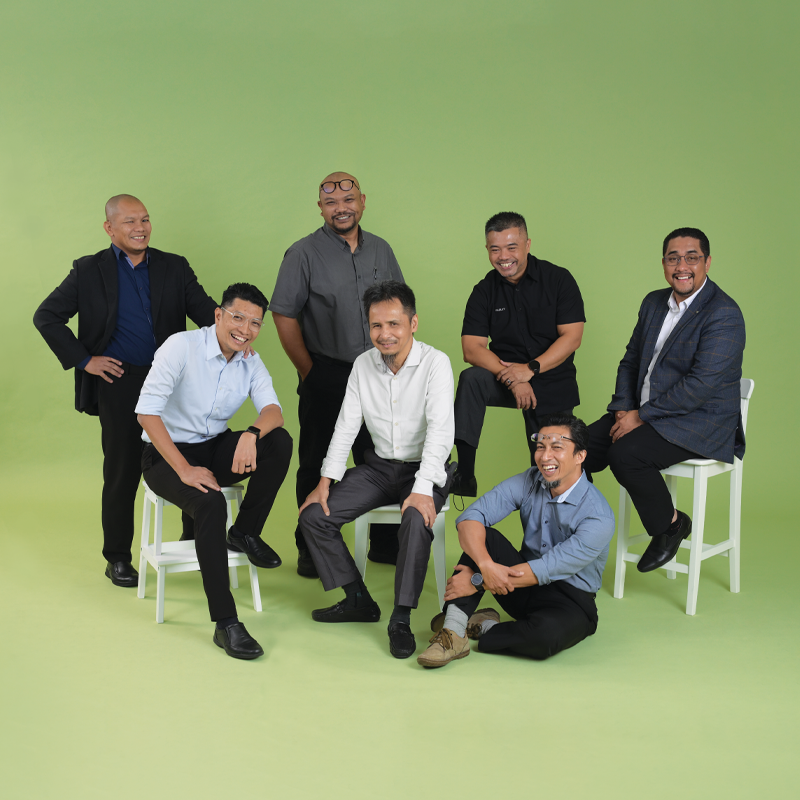
[Left to right:] Mohd Razif Ramli, Mohd Firdaus Mohd Ali, Norhazam Mohd Nor, Azizil Muhammadiah Abu Hassan, Fadley Wahab, Habibullah Rejab, and Mohamad Yazed Bahaman
Mohd Razif Ramli: At the heart of learner affairs is trust, knowing that the university will listen, respond, and follow through without judgment. I see my role as creating that sense of assurance, so every learner feels they belong.
Mohd Firdaus Mohd Ali: Assessments may mark a point in time, but they often carry the weight of everything that came before. I approach each executive task with the awareness that behind every script is a learner who tried, and that effort in itself deserves understanding and respect.
Norhazam Mohd Nor: Good tech should feel invisible when it works, just quietly doing its job. What matters to me is making sure every fix clears the path so learners can stay engaged and move forward with confidence.
Azizil Muhammadiah Abu Hassan: Some of the most meaningful work we do in supporting learners happens between the lines, in unseen moments when they reach out. Being present then is when care becomes real.
Fadley Wahab: Behind a desk or beyond it, I serve with the same heart. I carry OUM’s values with pride, on the road and in life.
Habibullah Rejab: Even in finance, the numbers tell a human story. The decisions we make are not just about balance sheets; they’re about sustaining access, enabling learning, and ensuring that care remains at the heart of OUM’s mission.
Mohamad Yazed Bahaman: In marketing, the task to which my team and I dedicate ourselves is not selling a product, but inviting people to a place of hope. To me, that is one of many steps through which OUM, as a collective, humanises digital education.
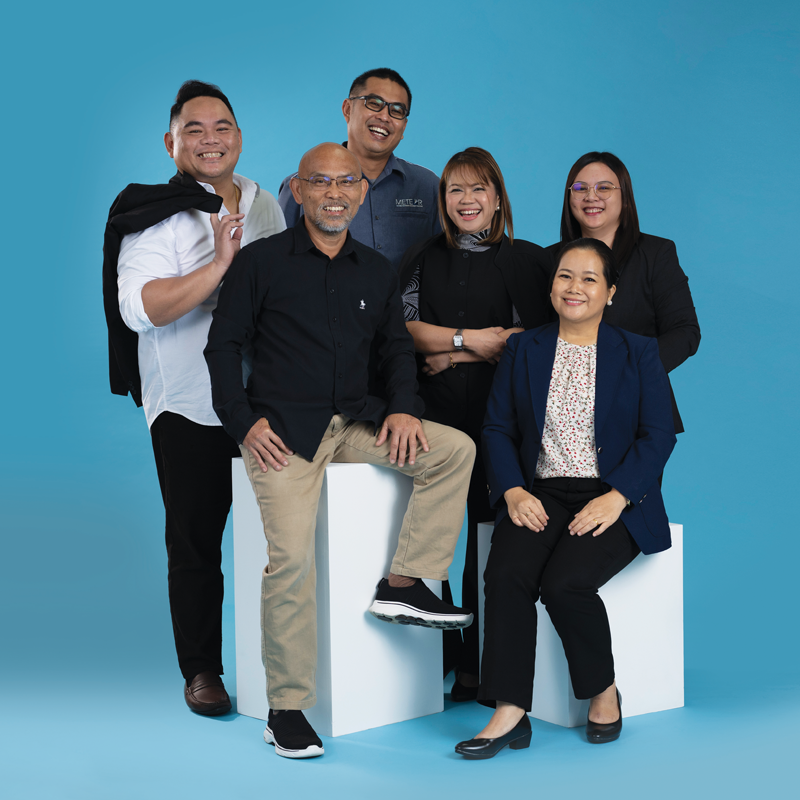
[Left to right:] Edwin Anak Francis, Joshua Mariyam Anak Duum, Darmari Ziano bin Alias Darman, Avril Noviana Anak Christopher Kadir, Noritha Arun (seated), and Edreen Edward
Edwin Anak Francis: To serve learners in the interiors of Sarawak is to witness resilience up close. OUM has given me the rare chance to bring education to places many overlook.
Joshua Mariyam Anak Duum: OUM has taught me that transformation doesn’t just happen in lecture halls; it also happens in living rooms, longhouses, and late nights after work. That’s the kind of change I believe in.
Darmari Ziano bin Alias Darman: I’ve watched learners juggle work, family, and studies—and graduate with pride. Their determination reminds me why OUM’s mission matters.
Avril Noviana Anak Christopher Kadir: There’s something powerful about watching learners grow in confidence, not just knowledge. OUM makes that possible every single day.
Noritha Arun: Behind every OUM graduate is a story of sacrifice. Supporting those stories through OUM has been one of the most fulfilling parts of my career.
Edreen Edward: OUM doesn’t just offer education; it offers dignity, second chances, and hope. I’m proud to stand behind that promise in East Malaysia.

[Left to right:] Indran Subrumanian, Krishnadas Narayanan, Dr Zitty Sarah Ismail, Kok Mong Lin, and Dr Azmawaty Mohamad Nor
Indran Subrumanian: I strive to be a steady presence, someone learners can count on, especially when the path gets challenging. Tutoring, to me, is about walking alongside them, not ahead.
Krishnadas Narayanan: I approach tutoring as a conversation, not a monologue. It’s in the questions, the pauses, and even the silences that understanding begins to take shape.
Dr Zitty Sarah Ismail: My approach has always been to blend precision with patience. Learners need room to explore complexity, without the fear of getting it wrong.
Kok Mong Lin: Every learner brings a different rhythm to the conversation. I listen closely, adjust gently, and ensure that no question ever feels too small to ask.
Dr Azmawaty Mohamad Nor: For me, tutoring starts with being approachable. When learners feel comfortable reaching out, real learning can happen— not just about the subject, but about themselves too.
National badminton player, currently pursuing OUM’s Bachelor of Accounting
OUM’s flexible structure allows me to manage academic responsibilities alongside national training. It’s not about convenience but rather about being able to stay committed to both paths without compromise, especially when competitions and travel involve an unpredictable and demanding schedule

Consultant cardiothoracic surgeon and OUM alumnus (Professional Certificate in Islamic Studies 2024), currently pursuing OUM’s Postgraduate Diploma in Islamic Studies
I have always believed that learning should continue beyond one’s profession. Studying Islamic Studies at OUM is a personal journey, one that enables me to reflect, ground, and deepen my understanding of the values that matter to me.
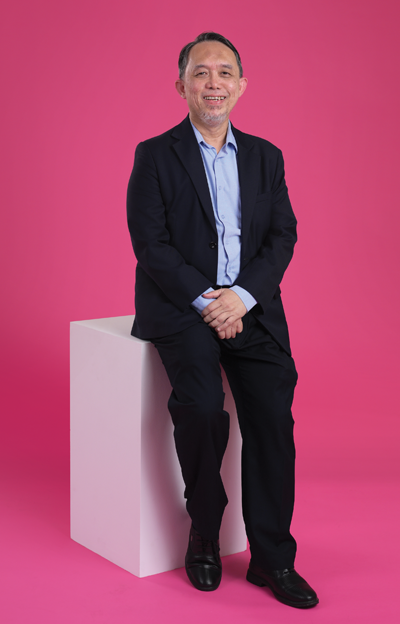
Accountant, company secretary, and OUM alumnus (Bachelor of English Studies 2020; Master of English Studies 2023), currently pursuing PhD (Arts) at OUM
OUM has become my academic home base, a space where I feel supported, yet continuously intellectually stimulated. The online setup fits seamlessly into my lifestyle, and I have grown familiar with the system. What makes the experience truly special are the connections I have formed with a band of digital nomads—my tutors and peers—who accompany me on this learning journey. Each course presents a progressive challenge, and at times even a leap of faith, but it is a journey I have come to cherish

Nishanti Vesulangam (Bachelor of Nursing Science, 2023–): Balancing study with life’s many rhythms has deepened my sense of discipline and purpose. With each course, I find myself engaging more fully, not just with the material, but with my own growth.
Roziah Burok (Bachelor of Nursing Science, 2022–): Each course invites me to think more deeply and respond more deliberately. Learning has become a way to connect ideas with purpose and insight.
Mohamad Shukor Ishak (Bachelor of Digital Media Design, 2024–): In the midst of life’s daily rush, studying has become quietly therapeutic. It gives me space to slow down, gather my thoughts, and return to myself with a little more clarity.
Nurul Syazana Sulaiman (Master of English Studies, 2024–): OUM has taught me that growth doesn’t have to be loud. Bit by bit, I’m becoming more thoughtful, more resilient, and more certain of the path i’m on.
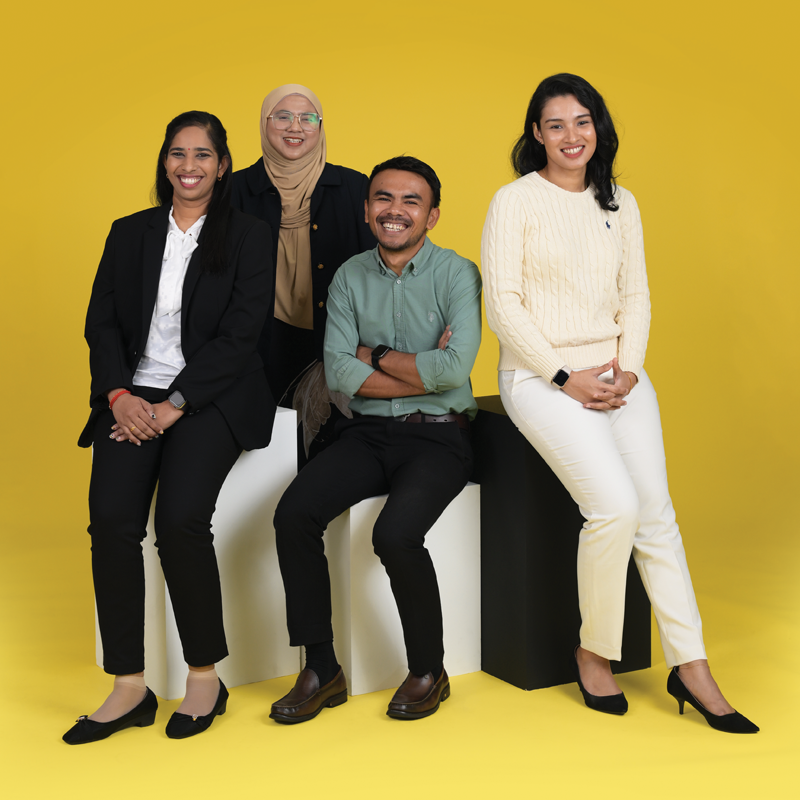
[Left to right:] Nishanti Vesulangam, Roziah Burok, Mohamad Shukor Ishak, and Nurul Syazana Sulaiman
Denesha Kaur Gopal Singh (Bachelor of Nursing Science, 2022–): Learning has helped me tune into what truly matters to me. This experience is opening up new ways of thinking about who I am and how I wish to grow.
Amar Sobri Ahmad Mokhtar (Master of Project Management, 2020–): I’ve always believed in purposeful progress. OUM has helped me focus that belief, showing me how knowledge can be a quiet force for change.
Siti Nor Hafizah Bohari (Diploma in Management, 2025–): My hope is to create impact through small, sustained actions. This path has shown me that change can be gentle and still deeply transformative.
Zarinna Abu Zarin (Doctor of Philosophy [Arts], 2023–): Education, to me, is a form of empowerment. At OUM, I’m learning how to turn intention into action, not just for myself, but for those I aim to uplift.

[Left to right:] Denesha Kaur Gopal Singh, Amar Sobri Ahmad Mokhtar, Siti Nor Hafizah Bohari, and Zarinna Abu Zarin
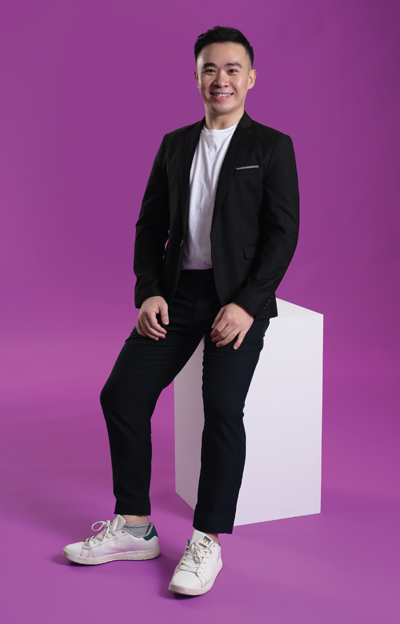
OUM alumnus (Bachelor of Psychology 2021), and former Malaysian national karate athlete (2008-2022)
Graduating with a Bachelor of Psychology from OUM has given me a robust analytical framework to understand not just behavioural patterns but also the underlying cognitive and emotional processes in individuals and collectives. This insight has proven immensely valuable in both my personal and professional life.
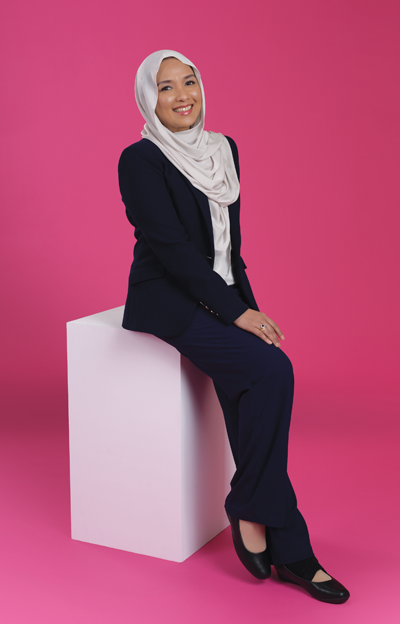
OUM alumna (Bachelor of English Studies 2015), actress, model, and television host
Being a graduate of OUM means more than just holding a degree; it is a testament to resilience, growth, and the pursuit of knowledge on my own terms. Juggling a career in the arts and my studies was not always easy, but the flexibility and support I received from OUM made it possible. It reminded me that learning doesn’t have to stop, no matter where you are in life. My journey with OUM empowered me to grow not just professionally, but personally. For that, I will always be grateful.
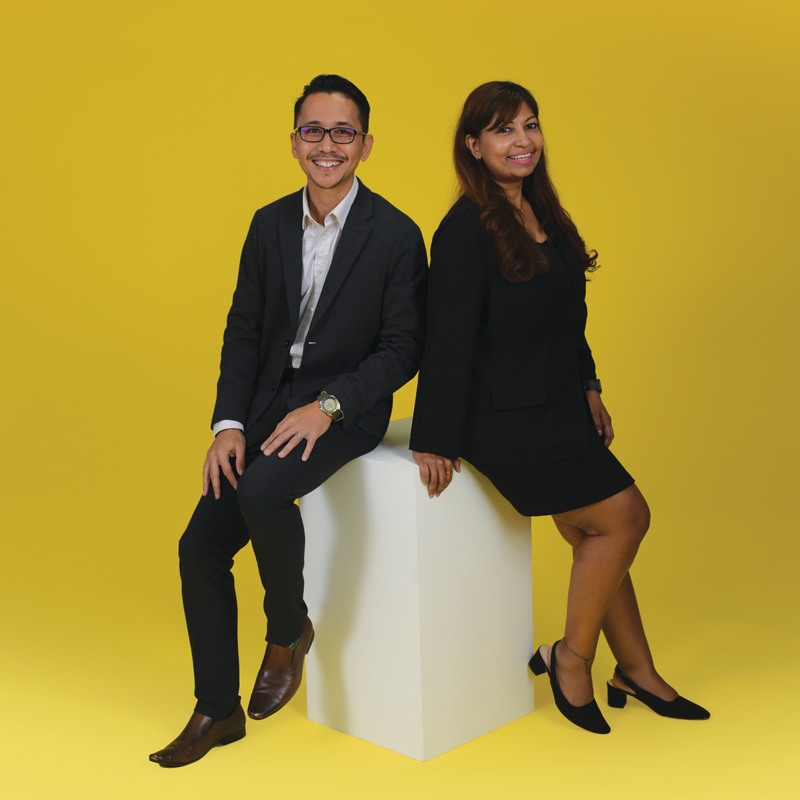
OUM alumnus (Master of Facility Management 2012), and CEO of Building Lindungan Sdn Bhd
OUM alumna (Master of Counselling 2024; Bachelor of Multimedia Communication 2009), and Senior Manager (Group Legal and Regulatory Affairs), Media Prima Berhad
I chose OUM because its flexible, yet structured learning environment aligned with the demands of managing complex, multi-state operations in facilities and maintenance services. The programme encouraged practical thinking and strategic insight, which complemented the realities of my day-to-day work, where planning, problem-solving, and people management are constant. It was a space where theory met practice in a way that felt immediately
While many pursued higher education at foreign-affiliated institutions, I chose OUM for its human-centric approach, affordability, and flexibility. Committed to supporting local education, I was drawn to OUM’s distinguished faculty, highly respected in the industry. My education at OUM has indeed enhanced my skills in communications, media, and, most recently, counselling, providing me with a firm foundation to make a meaningful impact in these fields.

OUM alumnus (Doctor of Business Administration 2015; Master of Project Management 2010), business leader, and best-selling author
OUM instilled in me the discipline of continuous learning and critical thinking, shaping my leadership approach in navigating complex industries. The flexible yet rigorous academic experience empowered me to balance professional responsibilities while advancing my knowledge, reinforcing the belief that education is a lifelong journey
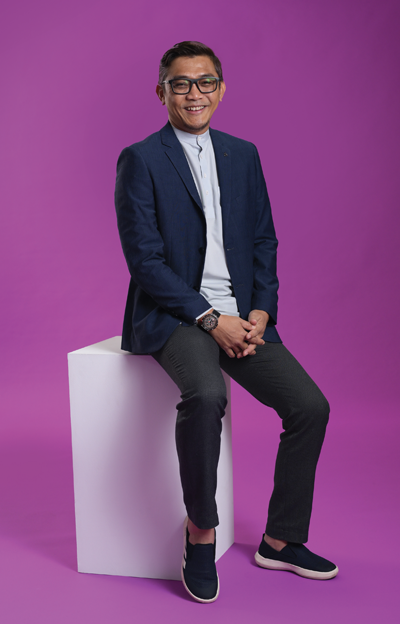
OUM alumnus (Bachelor of Business Administration 2024), and member of the Perlis State Legislative Assembly
OUM’s mission to make learning accessible to all— regardless of background, age, or location—aligns closely with the values I uphold in public service. My experience at OUM reinforced the belief that education is a powerful equaliser, and it continues to shape the way I serve my constituents and advocate for
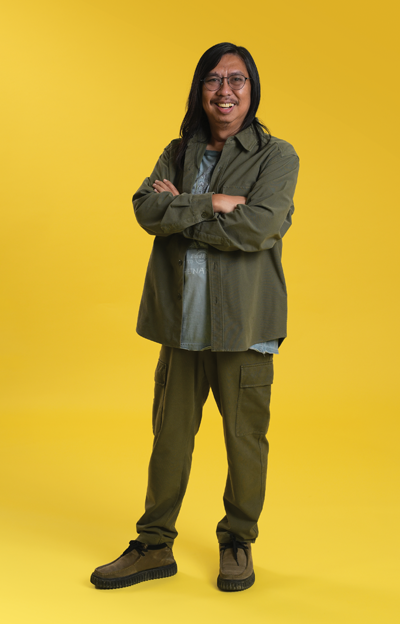
OUM alumnus (PhD Arts 2021), politician, youth activist, and member of OUM’s Board of Governors
Being a graduate of OUM is a point of pride for me. It reflects not just an academic milestone, but a commitment to growth, service, and continuous learning. The experience sharpened my ability to think critically, engage meaningfully with diverse perspectives, and stay grounded in the values that matter, all of which continue to guide
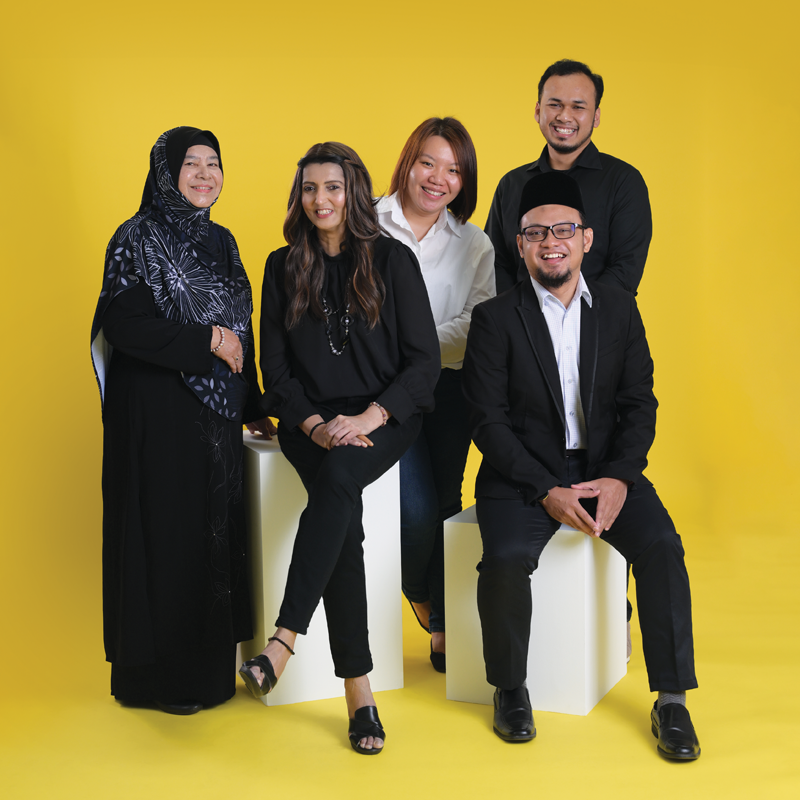
[Left to right:] Dr Umi Kalthum Ngah, Assoc Prof Dr Gurdip Kaur, Kok Yuen Yee, Mohamad Amirul Mohamad, and Mohd Danial Mohd Saodi (seated)
Dr Umi Kalthum Ngah (Bachelor of Psychology 2020): Studying at OUM taught me that true learning happens when empathy is present. I carry that lesson into every role I serve.
Assoc Prof Dr Gurdip Kaur Saminder Singh (Doctor of Education 2017): Even through a screen, I felt seen. The care shown by my supervisors and peers made a profound difference in my journey and inspires how I now mentor others.
Kok Yuen Yee (Master of Counselling 2024): OUM’s support system made me feel safe to be vulnerable, to explore, and to grow. That sense of connection still informs how I walk alongside my clients today.
Mohamad Amirul Mohamad (Bachelor of Digital Media Design 2021): In life and work, I value imagination— but OUM showed me that creativity grounded in care can truly move people. That lesson continues to shape everything I do.
Mohd Danial Mohd Saodi (Master of Islamic Studies 2024): Every course I took at OUM gently affirmed that knowledge means little without compassion. It’s a truth that shaped my growth in both faith and purpose.
OUM Honorary Doctorate Recipient (2022), community activist, para-athlete, and poet
Receiving OUM’s Honorary Doctorate is deeply meaningful to me. It affirms the work I’ve dedicated my life to, and it reminds me that every effort, no matter how challenging, contributes to something

OUM Honorary Doctorate Recipient (2022) and former Deputy Inspector-General of the Royal Malaysian Police (PDRM)
I am humbled to have received OUM’s Honorary Doctorate after a lifetime of service in the Royal Malaysian Police. This recognition is not only a personal honour, but also a reflection of the values I have upheld throughout my career: dedication, integrity, and service to the nation. It also speaks to the importance of education as a force for positive change, and I am grateful to be acknowledged by a university that continues to make learning.


inspired is OUM’s not-for-profit popular journal on the 3Ps – practice, policy and philosophy – of open, distance, and digital higher education (ODDE). Published three times a year, it engages global scholars, policymakers, practitioners, learners, and other stakeholders, as well as a general readership seeking the latest insights and perspectives on ODDHE.
Menara OUM, Block C, Kelana Centre Point, Jalan SS7/19,
Kelana Jaya, 47301 Petaling Jaya, Selangor, Malaysia
+603-7801 1800 (General Line)
inspired@oum.edu.my

Copyright © Open University Malaysia 2018 – 2025 inspired All Rights Reserved. No part of inspired may be reproduced in any form or by any means without the written consent of the Editor of inspired.